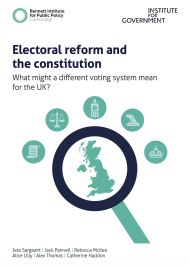
The impact of changing the UK’s electoral system would go far beyond the outcomes of elections themselves – and proponents of change should fully explore the important knock-on implications for government, parliament and the union.
This report draws on examples from within the UK and across the world to set out what a move away from ‘first past the post’ could mean for government formation, how government operates, how the House of Commons functions, devolution and the union, and Westminster’s political culture.
Recent experiences in the UK have shown that first past the post is no more guaranteed to deliver stable government than other electoral systems. Since 2010, the UK has spent more time under coalition or minority government (seven years and six months) than single-party majority government (five years and seven months). But a period of political disruption would inevitably follow electoral reform as ministers, MPs, commentators and the public adjust to the changes in electoral dynamics that would follow a change in how the UK votes.
With the UK’s institutions built for a majoritarian system, the report, part of the IfG/Bennett review of the UK constitution, sets out questions and recommendations that proponents of electoral reform should consider now to maximise the potential future benefits of electoral reform.
It also warns that proponents of electoral reform should ensure that any change in the voting system commands public support – with a robust process for considering the options for a new voting system and a democratic process, such as a referendum, to ensure there is a clear mandate for change.





